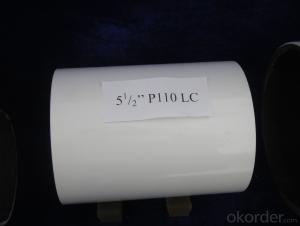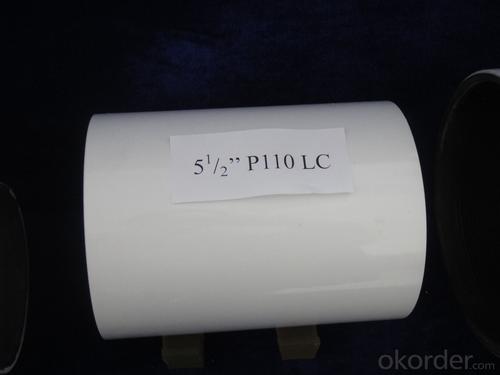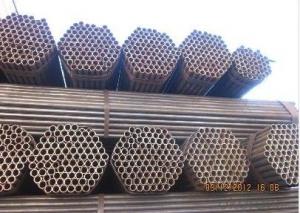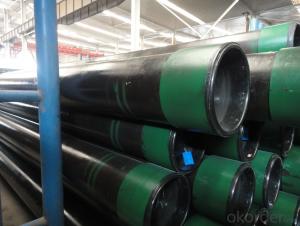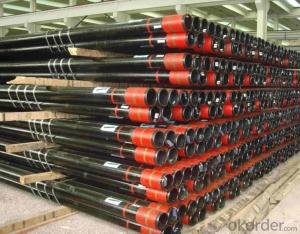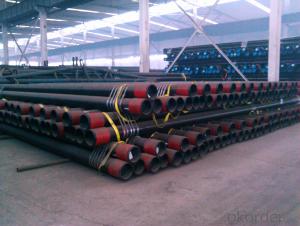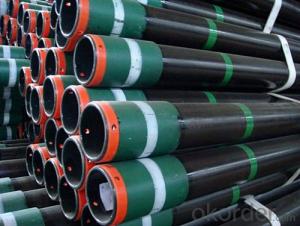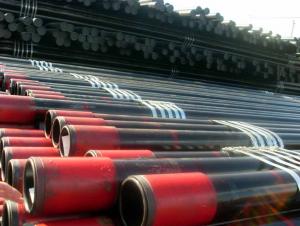API 5CT J55 K55 N80 L80 P110 casing pipe and tubing
- Loading Port:
- Tianjin
- Payment Terms:
- TT OR LC
- Min Order Qty:
- 10 m.t.
- Supply Capability:
- 100000 m.t./month
OKorder Service Pledge
Quality Product, Order Online Tracking, Timely Delivery
OKorder Financial Service
Credit Rating, Credit Services, Credit Purchasing
You Might Also Like
Specifications
1.Standard: API 5CT-0735 & ISO9001:2008
2.Specifcation: 4 1/2"- 20"
3.OD: 114.30 - 508 mm
4.WT: 5.21 -13.06 mm
API 5CT Casing pipe and Tubing:
Steel grade: J55 K55 N80-1 N80-Q L80 P110
Size: Tubing 2 3/8" - 4 1/2"
Casing pipe 4 1/2"-20"
Certification: API 5CT
Length: R1(4.88-7.62M) R2(7.62-10.36M) R3(10.36-14.63M)
Thread type: BTC LC SC
- Q: How many fasteners are there in a ton of steel tubes?
- The fastener generally refers to the intermediate connecting parts connecting two members, in the construction project for external diameter of steel pipe scaffold with 48mm fixation, the fastener is divided into rectangular fastener (cross directional fastener fastener) rotary fastener (universal movable fastener fastener) (a direct docking fastener fastener fastener) etc..
- Q: Can steel pipes be used for transporting hazardous materials?
- Yes, steel pipes can be used for transporting hazardous materials. Steel is highly durable and can withstand the pressure and temperature requirements of hazardous material transportation. Additionally, steel pipes can provide a reliable barrier against leaks and spills, minimizing the risk of environmental contamination. However, it is essential to consider the specific properties and compatibility of the hazardous material being transported to ensure the steel pipes are suitable for the task.
- Q: What are the different types of steel pipe reducers?
- There are several types of steel pipe reducers, including concentric reducers, eccentric reducers, and reducing tees.
- Q: What are the thermal properties of steel pipes?
- Steel pipes have excellent thermal properties. They have a high thermal conductivity, which means they can efficiently transfer heat. Additionally, steel pipes have a high melting point, making them suitable for handling high temperatures without any significant deformation or damage.
- Q: Are steel pipes magnetic?
- Yes, steel pipes can be magnetic. Steel, which is primarily composed of iron, is a ferromagnetic material. This means that it can be magnetized or attracted to magnets. However, not all steel pipes are magnetic as the magnetic properties of steel can vary depending on the specific composition and production methods used. In some cases, steel can be made non-magnetic by adding certain alloying elements or by subjecting it to specific heat treatments. Additionally, the strength of the magnetic field that steel pipes can exhibit can vary depending on factors such as the thickness of the pipe and the strength of the magnet being used.
- Q: What is the difference between standard wall thickness and extra-strong wall thickness steel pipes?
- The main difference between standard wall thickness and extra-strong wall thickness steel pipes lies in their thickness and durability. Standard wall thickness pipes have thinner walls and are suitable for most general applications, while extra-strong wall thickness pipes have thicker walls and are designed for heavy-duty or high-pressure applications. These extra-strong pipes offer enhanced strength and resistance, making them more reliable and suitable for handling extreme conditions or demanding projects.
- Q: What are the different methods of joining steel pipes without welding?
- There are multiple ways to connect steel pipes without welding. These include: 1. Mechanical Couplings: These couplings consist of two separate pieces that attach to the pipe ends and then tighten together. They provide a secure and leak-proof connection, eliminating the need for welding. 2. Threaded Connections: This method involves threading the ends of the steel pipes to create a male and female connection. The pipes are then screwed together using pipe threads, creating a strong and dependable joint. 3. Flanged Connections: Flanges are utilized to connect steel pipes by bolting them together. The flanges have a flat surface with holes that align with corresponding holes in the opposing flange. Bolts are inserted and tightened to establish a tight seal. 4. Grooved Connections: This technique involves grooving the pipe ends and using grooved couplings to join them. The couplings have teeth that interlock with the grooves, resulting in a secure and rigid connection. 5. Compression Fittings: Compression fittings are employed to connect steel pipes by compressing a metal or plastic ring onto the outer surface of the pipe. This creates a tight seal and a reliable connection without welding. 6. Adhesive Bonding: Special adhesives designed for bonding metals can be used to connect steel pipes. The adhesive is applied to the pipe surfaces, which are then pressed together and left to cure, forming a strong and durable bond. 7. Clamping: Clamps can be used to hold steel pipes together, creating a temporary connection. This method is commonly used for testing purposes or in situations where the pipes need to be easily dismantled. Each of these methods has its own benefits and limitations, and the choice depends on various factors such as the specific application, pipe material, and required joint strength.
- Q: What are the different types of steel pipe supports for overhead piping?
- There are several types of steel pipe supports for overhead piping, including pipe hangers, pipe clamps, beam clamps, and pipe rollers. Pipe hangers are used to support vertical pipes, while pipe clamps provide support for horizontal pipes. Beam clamps are designed to attach to structural beams and provide support for the pipe. Pipe rollers are used to allow the pipe to move freely, accommodating expansion and contraction.
- Q: How are steel pipes used in the construction of coal-fired power plants?
- Steel pipes are commonly used in the construction of coal-fired power plants for various purposes. They are utilized for transporting coal and other fuels, as well as for carrying water and steam in the power generation process. Steel pipes are also used in the construction of the plant's cooling system, helping to circulate water and dissipate heat. Additionally, they are employed in the construction of the plant's exhaust system, facilitating the removal of combustion byproducts. In summary, steel pipes play a crucial role in the infrastructure of coal-fired power plants, enabling efficient fuel transportation, heat exchange, and waste management.
- Q: How are steel pipes used in the manufacturing of desalination plants?
- Steel pipes are used in the manufacturing of desalination plants to transport the seawater from the intake point to the treatment facilities. These pipes are durable, corrosion-resistant, and can withstand the high-pressure conditions required for the desalination process.
Send your message to us
API 5CT J55 K55 N80 L80 P110 casing pipe and tubing
- Loading Port:
- Tianjin
- Payment Terms:
- TT OR LC
- Min Order Qty:
- 10 m.t.
- Supply Capability:
- 100000 m.t./month
OKorder Service Pledge
Quality Product, Order Online Tracking, Timely Delivery
OKorder Financial Service
Credit Rating, Credit Services, Credit Purchasing
Similar products
Hot products
Hot Searches
Related keywords
